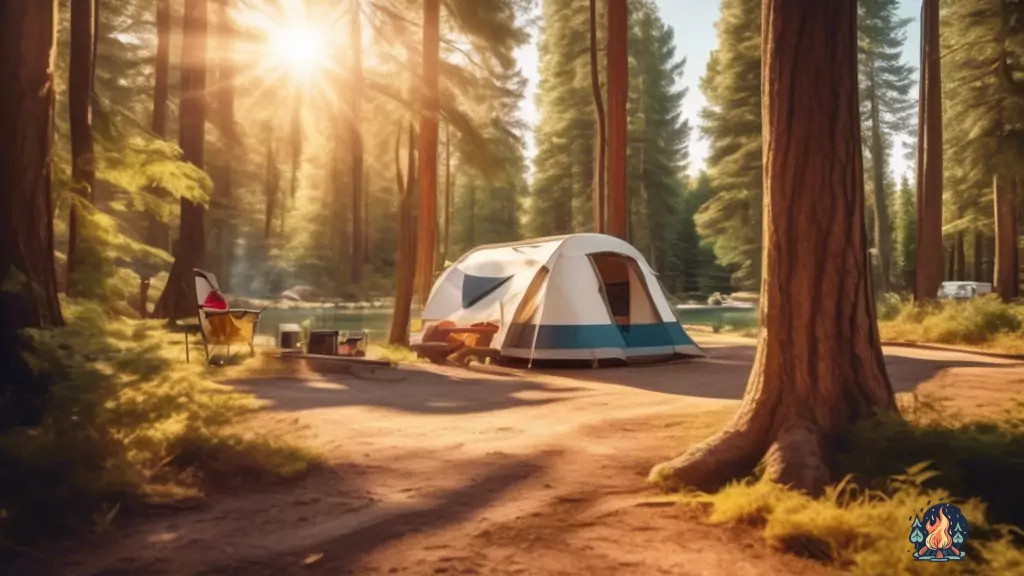Tent Vs RV Living: Which One Is Right For You?
by Kevin Fairbanks • Updated: January 30, 2024
Unleash your inner adventurer and choose the perfect outdoor experience! Explore the tent vs RV living debate to find out which one suits you best. Click now and make your outdoor dreams a reality!

Are you tired of the mundane routine of everyday life? Do you long for a sense of adventure and freedom? Well, look no further!
In this article, we will explore the exciting world of tent and RV living, and help you decide which one is right for you. Prepare to be amazed as we delve into the pros and cons of each option, and provide you with valuable insights to aid in your decision-making process.
So, grab a cup of coffee, get cozy, and let’s embark on this thrilling journey together!
Picture this: waking up to the sound of birds chirping, the gentle rustling of leaves, and the fresh scent of nature enveloping you. Imagine opening your eyes to a breathtaking view of mountains or a serene lake right outside your window. Ah, the joys of tent living! Living in a tent allows you to fully immerse yourself in the great outdoors, connecting with nature on a whole new level.
However, don’t be fooled by its romantic appeal – tent living also comes with its fair share of challenges.
On the other hand, if you prefer the comforts of modern amenities while still being able to travel and explore, then RV living might be the perfect fit for you. With a cozy bed, a fully-equipped kitchen, and your own personal bathroom on wheels, RV living offers the ultimate blend of comfort and adventure.
But, as with anything in life, there are downsides to consider as well. So, get ready to weigh the pros and cons, as we delve deeper into the world of tent and RV living.
Key Takeaways
- Tent living offers a closer connection to nature and a more immersive experience, while RV living provides comfort and convenience.
- Tent living lacks privacy and can be uncomfortable, especially for those who are not comfortable with sleeping on the ground. On the other hand, RV living offers a bed, kitchenette, and bathroom, providing more comfort.
- Tent living requires regular maintenance and care, while RV living also requires maintenance but is generally less time-consuming.
- Tent living is more affordable upfront, but requires additional expenses for camping gear and equipment. RV living, on the other hand, requires a significant investment upfront but can save money on accommodations in the long run.
Pros and Cons of Tent Living
If you enjoy sleeping on uneven ground, being at the mercy of the elements, and having no privacy whatsoever, then tent living is definitely the way to go! There’s something incredibly intimate about being so close to nature, feeling the earth beneath you as you slumber under the stars.
The unpredictability of the weather can add an element of excitement to your everyday life, as you wake up to the sound of raindrops on your tent or feel the warmth of the sun on your face. And let’s not forget about the lack of privacy. In a tent, you’re essentially living in a fishbowl, with no walls to separate you from the outside world. It’s an experience that can bring you closer to your surroundings and make you feel truly connected to the natural world.
But of course, there are downsides to tent living as well. The uneven ground can wreak havoc on your back, leaving you with aches and pains that can make sleeping uncomfortable. And while being at the mercy of the elements can be thrilling, it can also be exhausting. Constantly battling the rain, wind, and cold can take its toll on your mental and physical well-being.
And let’s not even get started on the lack of privacy. If you value your personal space and alone time, tent living might not be the best choice for you. It’s important to weigh the pros and cons and consider what you value most in your living situation.
Pros and Cons of RV Living
Imagine the freedom and versatility of traveling wherever you want, but still having the comforts of home at your fingertips. That’s exactly what RV living offers you. With an RV, you have the ability to go on spontaneous adventures, explore new places, and create lasting memories, all while having the convenience of a kitchen, bathroom, and comfortable sleeping arrangements. No need to worry about setting up a tent or finding a clean bathroom, because with an RV, everything is right there for you.
One of the biggest advantages of RV living is the flexibility it provides. You can easily change your plans and go wherever the road takes you. Whether you want to spend a weekend at the beach, go hiking in the mountains, or visit multiple national parks, an RV allows you to do it all. Plus, you have the luxury of bringing along all the amenities and supplies you need, without the hassle of packing and unpacking every time you move to a new location.
However, it’s important to consider the downsides of RV living as well. One drawback is the cost. RVs can be quite expensive to purchase, and there are additional expenses such as fuel, maintenance, and campground fees. Additionally, living in an RV may require you to downsize and adapt to a smaller living space. While some people enjoy the simplicity and minimalistic lifestyle that RV living offers, it may not be for everyone.
It’s also worth noting that RVs can be more challenging to maneuver and park compared to a tent, especially in crowded areas or tight spaces.
Overall, RV living offers a unique and exciting way to travel and experience the world. It provides the freedom to go wherever you want, while still having the comforts of home. However, it’s important to weigh the costs and potential challenges before deciding if RV living is the right choice for you.
Factors to Consider Before Choosing
Before making a decision, it’s important to consider various factors that can impact your choice between tent and RV living.
First and foremost, think about your lifestyle and preferences. If you enjoy the simplicity and freedom of camping, then tent living might be the perfect fit for you. Sleeping under the stars, waking up to the sounds of nature, and feeling a sense of connection with the outdoors can be incredibly fulfilling.
On the other hand, if you value comfort and convenience, an RV might be more suitable. With an RV, you have a cozy bed, a kitchen, and a bathroom all in one compact space. It’s like having a portable home on wheels, allowing you to travel comfortably and have all the amenities you need.
Another factor to consider is the level of maintenance and upkeep you’re willing to commit to. Tent living requires minimal maintenance, as you simply need to set up and take down your tent when you’re ready to move.
RV living, on the other hand, requires regular maintenance and upkeep to ensure that everything is working properly. From checking the engine and tires to maintaining the plumbing and electrical systems, there’s a bit more work involved with owning an RV. If you’re not comfortable with or interested in taking on these responsibilities, tent living might be the better option for you.
In conclusion, before deciding between tent and RV living, take the time to think about your lifestyle, preferences, and willingness to commit to maintenance. Consider what brings you joy and fulfillment, and choose the option that aligns best with your needs. Whether it’s the simplicity and freedom of tent living or the comfort and convenience of RV living, the choice is ultimately yours.
Cost Comparison
Deciding between the two options can be a financial challenge as there are significant cost differences. While tent living may seem like the more affordable choice at first, there are additional expenses that can quickly add up.
Here is a breakdown of the costs to consider for both tent and RV living:
- Tent living:
-
Initial tent purchase: While tents can range in price, a good quality tent can cost anywhere from $100 to $500 or more.
- Camping gear: You will need to invest in camping gear such as sleeping bags, cooking equipment, and portable toilets, which can easily cost several hundred dollars.
- Campsite fees: Depending on the location and amenities, campsite fees can range from $10 to $50 per night. If you plan on staying long-term, these fees can quickly accumulate.
-
- RV living:
-
RV purchase or rental: The cost of an RV can vary greatly depending on the size and features. You can find used RVs for as low as $5,000, or opt for a brand new one that can cost upwards of $100,000. Renting an RV can also be an option, with prices ranging from $100 to $300 per night.
- Maintenance and repairs: RVs require regular maintenance and occasional repairs, which can add to the overall cost. It’s important to budget for these expenses to ensure your RV stays in good condition.
- Campground membership or RV park fees: If you plan on staying in campgrounds or RV parks, you may need to pay a monthly or yearly fee. These fees can range from $200 to $800 per month, depending on the location and amenities.
-
As you can see, there are several cost considerations to take into account when deciding between tent and RV living. While tent living may have a lower initial cost, the ongoing expenses of camping gear and campsite fees can quickly add up. On the other hand, RV living requires a larger upfront investment but provides more convenience and potentially lower accommodation costs in the long run.
Ultimately, it’s important to evaluate your budget and lifestyle preferences to determine which option is right for you.
– What Are The Benefits of RV Living Over Tent Camping for Motorcycle Camping?
When choosing the perfect motorcycle tent for camping, consider the benefits of RV living over tent camping. RVs provide more comfort, storage space, and amenities such as kitchen, bathroom, and electricity, making motorcycle camping more convenient and enjoyable. Ultimately, RVs offer a more comfortable and convenient camping experience for motorcycle enthusiasts.
Personal Preferences and Lifestyle Considerations
One interesting statistic to consider is that personal preferences and lifestyle choices play a significant role in determining the best living option between tent living and RV living. While cost is an important factor, it is equally important to take into account your individual preferences and lifestyle considerations. Are you someone who enjoys being close to nature and doesn’t mind roughing it? Or do you prefer the convenience and comfort of modern amenities? Understanding your own preferences can help guide your decision.
To help you further explore your personal preferences and lifestyle considerations, let’s compare some key factors between tent living and RV living. Below is a table that highlights some of the main differences:
| Tent Living | RV Living | |
|---|---|---|
| Level of Comfort | May be less comfortable due to sleeping on the ground and limited amenities | Generally more comfortable with a bed, kitchenette, and bathroom |
| Mobility | Limited mobility as tents need to be set up and taken down | High mobility as RVs are designed for travel |
| Connection to Nature | Provides a more immersive experience, allowing you to feel closer to nature | Can still enjoy nature, but with the added convenience of a home on wheels |
| Maintenance | Requires regular maintenance and care, including waterproofing and cleaning | RVs require maintenance as well, but it is typically less time-consuming |
| Cost | Can be more affordable upfront, but may require additional expenses for camping gear and equipment | RVs can be a significant investment upfront, but can save money on accommodations in the long run |
By considering these factors, you can gain a better understanding of which living option aligns better with your personal preferences and lifestyle. Whether you value comfort and convenience or prioritize a closer connection to nature, there is no right or wrong choice. It ultimately comes down to what makes you feel most at home and fulfilled in your living environment.
Frequently Asked Questions
Are there any restrictions or regulations on tent or RV living in certain areas?
Yes, there are restrictions and regulations on tent or RV living in certain areas. Each region has its own rules, which may include permits, time limits, and designated camping areas. It’s essential to research and comply with local laws before making any living arrangements.
How do you handle waste disposal when living in a tent or RV?
When living in a tent or RV, waste disposal can be managed efficiently. Did you know that on average, an RV generates about 20 gallons of wastewater per day? Proper disposal methods and facilities are essential for a comfortable and sustainable lifestyle.
What are some common safety concerns associated with tent or RV living?
When it comes to safety concerns in tent or RV living, there are a few things to keep in mind. From potential accidents and fire hazards to wildlife encounters, it’s important to stay vigilant and prepared.
Can you have pets while living in a tent or RV?
Yes, you can have pets while living in a tent or RV. They can bring joy, companionship, and a sense of home on your nomadic journey. Just make sure to create a safe and comfortable environment for them.
Are there any legal considerations or permits required for tent or RV living?
Yes, there are legal considerations and permits required for tent or RV living. Regulations vary by location, so it’s important to research local laws and obtain necessary permits to ensure a hassle-free living experience.

Hi, I’m Kevin, a lifelong camping enthusiast and the voice behind Campfire Discoveries. From tent to RV to cabin camping, I’ve explored it all. Join me as we share stories and tips around the campfire, deepening our connection with the great outdoors.
Keep Reading
-
Fun For The Kids: RV Parks With Exciting Playgrounds
Looking for RV parks with exciting playgrounds for your kids? Check out our list of the best options for a fun-filled family adventure. Don’t miss out, start planning your trip today!
-
Tent With Solar Panels: Harnessing The Power Of The Sun
Experience a game-changer in camping with a tent equipped with solar panels! Learn how to elevate your adventure sustainably by harnessing the power of the sun. Click now to revolutionize your outdoor experience.
-
Important Fire Safety Rules For Campfires
Learn the crucial fire safety rules for campfires to protect yourself and your loved ones. Stay safe during your next camping adventure. Click here now!



